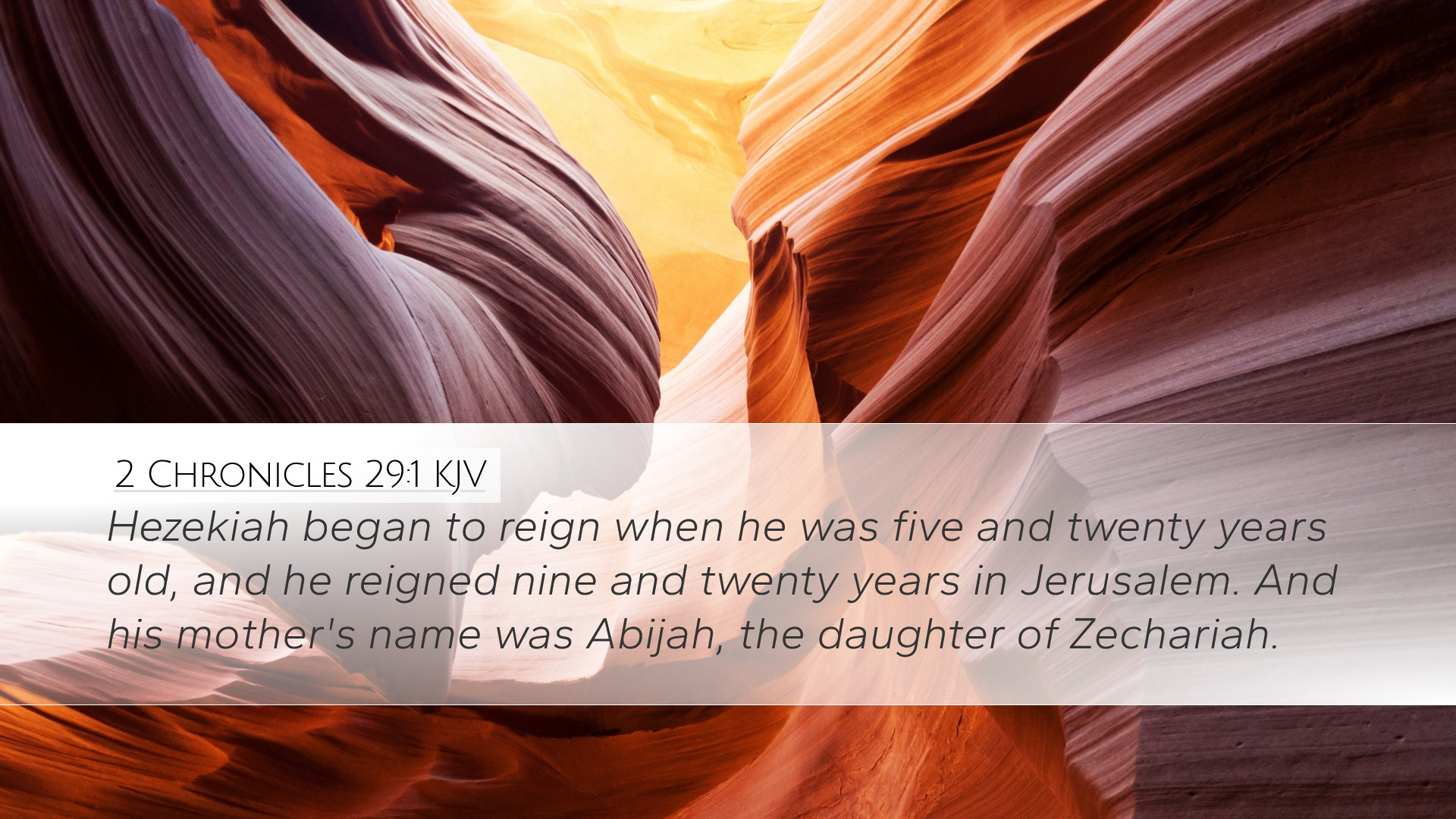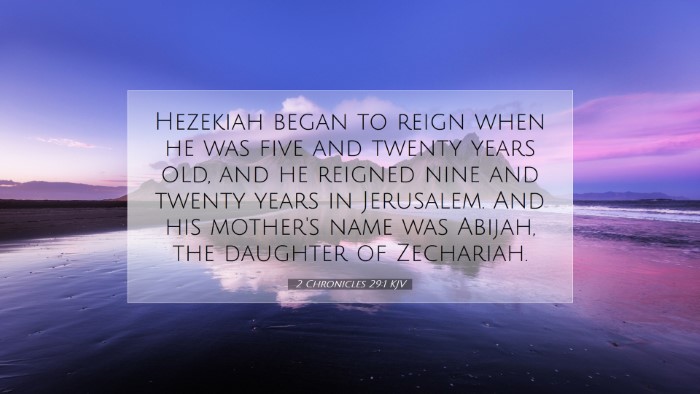Commentary on 2 Chronicles 29:1
2 Chronicles 29:1 states: "Hezekiah began to reign when he was five and twenty years old, and he reigned nine and twenty years in Jerusalem. And his mother's name was Abijah, the daughter of Zachariah." This verse serves as an introduction to the reign of King Hezekiah, a pivotal figure in Judah's history and a model of reform and devotion to God. Below is a consolidated commentary based on several public domain sources, focusing on the significance of this verse in its historical and theological context.
Historical Context
The reign of Hezekiah, commencing at the age of 25, is notable for various reforms aimed at restoring the worship of Yahweh and purging Judah of idolatry. His mother, Abijah, being the daughter of Zachariah, connects him to a line of leadership that esteemed the Lord, highlighting the importance of familial spiritual heritage.
Godly Heritage
- Matthew Henry emphasizes that Hezekiah’s maternal lineage may have influenced his faith and decisions. His mother's name being mentioned indicates the significance of godly influence in his upbringing.
- Albert Barnes notes that in pagan contexts, royal ancestry often ties rulers to divine favor; in Hezekiah's case, this was rooted in a covenantal relationship with the one true God.
- Adam Clarke suggests that Hezekiah’s mother likely played a crucial role in instilling spiritual values, making the historical narrative personal and relatable for believers.
The Significance of the Age of Ascension
At 25, Hezekiah was relatively young when he assumed the throne. This age is worthy of consideration for several reasons:
- Maturity and Wisdom: Commentators point out that Hezekiah’s maturity can be attributed to the influence of the previous reforms and the spiritual climate enabled by his predecessors. His young age reminds contemporary leaders that effective ministry and governance are not solely determined by experience but also by conviction and passion.
- Divine Appointment: His ascension to the throne at a young age underscores the divine sovereignty at work, something emphasized by Henry. Such appointments are often intended to show that God's plans are not hindered by human limitations.
- Relatability to Youth: Hezekiah stands out as a relevant figure for younger leaders today. The narrative provides assurance that God can work powerfully through those who are young and willing, as noted by Barnes.
Length of Reign as a Divine Favor
Reigning for 29 years, Hezekiah's tenure is marked by notable events, including significant religious reforms and military victories. The length of his reign can be interpreted as a sign of God's favor:
- Long-Term Influence: Henry associates his extended reign with his dedication to God, confirming the idea that faithfulness can lead to sustained success. His reforms had lasting impacts on the people of Judah, rejuvenating their spiritual lives.
- Contrast with Previous Kings: This reign stands in stark contrast to that of Ahaz, his father, who led Israel into idol worship. Clarke highlights that divine patience and mercy were still available to Judah amidst cycles of disobedience, showcasing God's willingness to redeem.
- Historical Implications: Barnes points out that Hezekiah's reign provided vital leadership, particularly in the face of external threats, demonstrating how God raises leaders in strategic moments of need.
Implications for Leadership and Spiritual Renewal
Hezekiah’s reign serves as a model for contemporary leaders, both in the church and secular spheres. Key implications include:
- Spiritual Reform: The necessity of seeking God earnestly and prioritizing a relationship over rituals, as highlighted by both Barnes and Henry.
- Community Orientation: Leadership should involve guiding the community towards collective worship and renewal, akin to Hezekiah’s reforms which inspired national repentance.
- Faithfulness in Adversity: Hezekiah faced significant challenges, yet his faithfulness won him divine assistance. This speaks to the importance of maintaining faith in the face of trials.
Conclusion
2 Chronicles 29:1 serves as a significant entry point into the study of Hezekiah’s reign and offers lessons for all believers. The account highlights how God can use young leaders, the importance of a godly heritage, and the possibility of renewal through reform. Commentaries from Henry, Barnes, and Clarke together inspire leaders to pursue holiness, remain faithful in their assignments, and understand the critical role of spiritual heritage in influencing the next generation.


